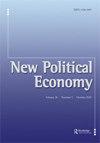保护还是惩罚债务人?政策制定者关于国家在个人债务治理中的作用的论述
IF 3.8
2区 经济学
Q1 ECONOMICS
引用次数: 0
摘要
个人债务是一种增加个人能动性的手段,但它植根于道德和法律框架,将人们构建为个性化的金融主体。本文旨在通过关注决策者关于国家在个人债务监管中的作用的话语中构建的个人债务治理模式,丰富关于国家在(主体)金融化中的作用的研究。我们的论点以捷克共和国为背景,2021年,捷克10%的成年人口面临法律债务强制执行,严重扰乱了他们的经济状况。通过对84份议会辩论记录和32份与消费者信贷和债务减免法相关的监管影响评估文件的分析,我们说明了债务治理和国家角色的矛盾心理和复杂性。尽管制定了两种主要的国家角色——惩罚性和保护性——政策制定者的话语形成了各种各样的连续体,混合了各种道德逻辑,归咎于多重责任(个人、国家和私人行为者),并就债务人的应得性进行了密集的谈判。我们认为,通过强调金融教育作为解决感知到的市场失灵(掠夺性贷款)的工具,金融化的逻辑和结构得到了重申,尽管为重新谈判和对此类国家功能的潜在抵抗留下了一定的话语空间。本文章由计算机程序翻译,如有差异,请以英文原文为准。
Protect or punish debtors? Policymaker discourse on the state’s role in personal debt governance
ABSTRACT Personal debt is a device increasing one’s agency but embedded within moral and legal frameworks that constructs people as individualised financial subjects. This article aims to enrich research on the state role in (subject) financialisation through a focus on personal debt governance modes as constructed in policymaker discourse on the state role in personal debt regulation. Our argument is contextualised in the Czech Republic, where, in 2021, 10 per cent of the adult population faced legal debt enforcement, significantly disrupting their economic situation. Through an analysis of 84 parliamentary debate transcripts and 32 regulatory impact assessment documents related to consumer credit and debt relief laws, we illustrate the ambivalence and complexity of debt governance and state roles. Although two main state roles were enacted – punitive and protective – the policymaker discourse forms a continuum of sorts, blending various moral logics, ascribing multiple responsibilities (individual, state and private actors) and intensively negotiating the category of debtor deservingness. We argue that by accenting financial education as a tool to solve perceived market failures (predatory lending), the financialised logic and structures are reaffirmed, albeit leaving certain discursive spaces for renegotiation and potential resistance against such state functions.
求助全文
通过发布文献求助,成功后即可免费获取论文全文。
去求助
来源期刊

New Political Economy
Multiple-
CiteScore
10.10
自引率
9.50%
发文量
41
期刊介绍:
New Political Economy aims to create a forum for work which combines the breadth of vision which characterised the classical political economy of the nineteenth century with the analytical advances of twentieth century social science. It seeks to represent the terrain of political economy scholarship across different disciplines, emphasising original and innovative work which explores new approaches and methodologies, and addresses core debates and issues of historical and contemporary relevance.
 求助内容:
求助内容: 应助结果提醒方式:
应助结果提醒方式:


